By Hannah Russo, Senior Correspondent
Published: May 31, 2025
Rep. Ritchie Torres has called on both New York City and state authorities to open formal investigations into the Park Slope Food Co-op following a series of troubling allegations that Jewish and pro-Israel members have been subjected to discrimination, harassment, and antisemitic hostility. The call for scrutiny marks a significant escalation in a growing controversy surrounding one of Brooklyn’s most iconic and politically active community institutions.
In official letters sent to Mayor Eric Adams and Governor Kathy Hochul, Torres outlined what he described as a “pattern of hostility” targeting certain co-op members based on their ethnic and political identities. The representative urged both the New York City Commission on Human Rights and the New York State Division of Human Rights to examine the co-op’s practices and internal culture for potential violations of civil rights laws.
A Cooperative in Crisis
The Park Slope Food Co-op, founded in 1973, has long been regarded as a progressive haven for conscious consumers, boasting more than 16,000 members. The co-op operates on a unique model requiring all members to contribute work shifts in exchange for access to its selection of affordable and ethically sourced groceries. Over the years, it has become known not only for its products but also for its culture of community-driven activism and member engagement.
However, that same spirit of activism has at times led to deep internal divisions. The latest rift revolves around debates concerning the Boycott, Divestment, and Sanctions (BDS) movement against Israel. Supporters of BDS advocate for economic and cultural boycotts of Israel as a means to protest its policies toward Palestinians, while critics view the movement as inherently antisemitic and discriminatory.
Mounting Allegations from Members
The current controversy intensified after the October 7, 2023, attacks on Israel, which reignited global conversations around the Israeli-Palestinian conflict. Within the co-op, tensions reportedly escalated during member meetings and board elections, with several Jewish and pro-Israel participants claiming they were subjected to hostility and threats.
Among the allegations is an incident involving a member who wore a Halloween costume referencing Sabra hummus—a brand with Israeli origins—and was allegedly mocked and harassed. Another member, who had run for a board position, claimed he faced verbal assaults during campaign events simply for expressing his support for Israel.
The atmosphere described by these members includes not only isolated incidents but an ongoing climate in which political bias and ethnic background intersect in ways that have caused distress and alienation for some. Several have alleged that their complaints were not taken seriously by co-op leadership, further deepening mistrust.
Official Response and Broader Implications
Although no formal charges have been filed at this time, city officials have confirmed that they are reviewing the complaints and may take further action depending on the findings. The state Division of Human Rights is reportedly assessing whether there is cause to initiate a broader inquiry.
The co-op’s leadership, while not directly addressing individual complaints, has reiterated its commitment to non-discrimination and inclusivity. In public statements, representatives have emphasized that the organization welcomes all members regardless of background and that it is governed by democratic processes in which every member has a voice.
Still, the spotlight now on the co-op has ignited a larger conversation about how ideologically driven spaces manage internal dissent and diverse identities. The case could set a precedent for how member-governed cooperatives are held accountable under civil rights statutes and anti-discrimination laws.
Political and Social Reverberations
Rep. Torres’ involvement underscores the growing sensitivity among public officials to antisemitism in community organizations, particularly as debates around global politics become increasingly heated in local contexts. His call for an investigation is being closely watched by community leaders, legal experts, and advocacy groups across New York.
This incident also raises questions about the limits of activism in communal settings and the responsibilities of such organizations to maintain safe spaces for differing viewpoints. As the Park Slope Food Co-op navigates this period of heightened scrutiny, its response may well shape the future of community organizing and democratic governance in similar institutions.


